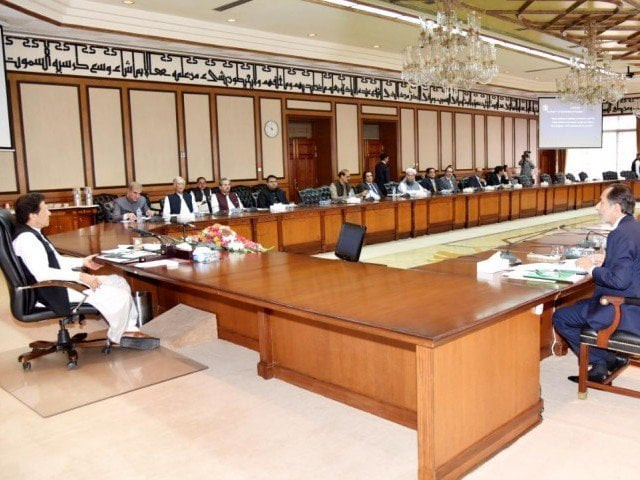Govt approves proposals for civil service reforms
Task force formulates recommendations for revamping recruitment, training and promotion criteria

A file photo of PM Imran Khan chairing a federal cabinet meeting. PHOTO: PTI
The Task Force on Institutional Reforms, headed by Dr Ishrat Hussain, formulated proposals to effectively review the present training system to make it more responsive to the requirements of policy formulation.
According to the Establishment Division, the prevalent challenges at the national and international levels require rethinking of strategies to make the institutions in the public sector more responsive and effective.
It said the government should apply best international and regional practices in various aspects of public administration such as recruitment, retention, training and motivation.
“Training is an important tool for skill development and enhancing capacities of officers,” it said, adding that keeping in view the importance of training, weightage to mandatory training was increased from 15% to 35% out of 100% for the promotion of officers to the next higher grade.
At present, there was a mechanism in place and institutions for imparting mandatory trainings. The mandatory trainings were divided into pre-service training and post-induction mandatory trainings for officers.
However, it was observed that these trainings covered only 6,000 of the 29,000 officers serving in the federal government.
There was no specific arrangement of separate mandatory trainings for specialists – both ex-cadre and non-cadre – either at post induction or any stage in order to cater to their needs and maximise their efficiency and performance. Hence, their professional expertise got outdated and they were transformed into paper-pushing bureaucrats. Further, there was a requirement to bring improvement in the existing training regimes, including infrastructure improvements and structural changes.
The Task Force on Institutional Reforms worked to review the present training system to make it more responsive to the requirements of policy forrmulation, public service delivery and governance. Several rounds of deliberations were held amongst stakeholders through sub-committees in focus groups. Their recommendations were presented to the prime minister who approved in principle these recommendations.
Recommendations
Post-induction training for three-six months in the areas of government organisation structure, procedures, rules, regulations and soft skills such as team building inter-personal and communication skills would be imparted to those entering the federal government in ex-or non-cadre positions. The training would be organised by the National School of Public Policy (NSPP).
The NSPP would be an apex body for standard settings, monitoring and quality assistance. Selection of participants, design, content and delivery of course would be decentralised to the training institution.
To attract higher calibre officers of integrity, behaviour and competence, the selection method of faculty, directing staff and the incentive structure of proposed specialised training institutes shall be brought at par with that of the NSPP.
All the training institutes shall be made autonomous with their own boards of governors drawn from academia, practitioners, retired civil servants etc. Linkages with leading universities and research organisations shall be established.



















COMMENTS
Comments are moderated and generally will be posted if they are on-topic and not abusive.
For more information, please see our Comments FAQ